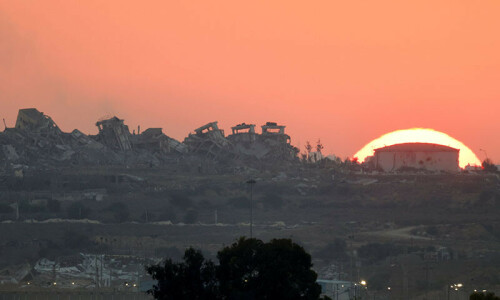SANAA: Arab coalition warplanes bombed rebel camps in Yemen Friday in a second straight day of strikes led by Saudi Arabia, which accused Iran of “aggression” across the region.
A months-long rebellion by Shia fighters has escalated into a regional conflict that threatens to tear apart the impoverished state at the southern tip of the Arabian Peninsula.
Sunni-ruled Saudi Arabia has vowed to do “whatever it takes” to prevent the fall of its ally President Abedrabbo Mansour Hadi, accusing Shia Iran of backing the Houthi rebels' power grab.
At least 39 civilians have been killed so far in the Saudi-led Operation Decisive Storm against the Houthis, officials at the rebel-controlled health ministry in the capital said.
Twelve of the victims died when surrounding residential areas were hit in a raid against a military base north of the capital, the officials told AFP.
Three dawn strikes Friday hit the presidential compound in south Sanaa which the rebels seized last month, witnesses said.
Warplanes also bombed a Houthi-controlled army brigade in Amran province, north of the capital, and arms depots in the northern rebel stronghold of Saada, residents said.
Hadi, backed by the West and Gulf Arab states, arrived in Riyadh on Thursday with officials saying he was on his way to Egypt to take part in a two-day Arab League summit at the weekend.
It was the first confirmation of his whereabouts since the rebels began advancing this week on the main southern city of Aden, where the president had taken refuge since fleeing Sanaa last month.
Saudi Arabia says more than 10 countries, including four other Gulf monarchies, have joined the anti-Houthi coalition.
'Terror and hysteria'
As explosions rocked Sanaa, those families who have not already fled huddled in fear in their homes.
“Whenever a plane flies over our home and is met by anti-aircraft gunfire, my three children run to a corner and start screaming and crying,” said Mohammed al-Jabahi, 32.
“We spent a night of non-stop terror and hysteria. “An anti-aircraft missile wounded eight people, one of them seriously, when it exploded in a market in Sanaa on Friday, a day after it was fired by Huthi fighters, a security official said.
The Saudi-owned Al-Arabiya television said the kingdom had deployed 100 fighter jets to the operation, while the United Arab Emirates had committed 30, Kuwait 15 each and Qatar 10. Bahrain said it had committed 12 fighters.
Saudi Arabia has reportedly also mobilised 150,000 troops near the border.
Trading accusations
The White House voiced concern about “reports of Iranian flow of arms into Yemen”, while Riyadh lashed out at Tehran.
“The Iranians are the ones who are meddling in the affairs of the Arab countries whether it's in Lebanon, in Syria, in Iraq... in Yemen,” the kingdom's ambassador to the United States, Adel al-Jubeir, told Fox News.
“We have to deal with Iran's aggression in the region. We're dealing with their support of the Houthis and the Houthis' attempt to take over in Yemen,” he added.
Iran reacted furiously to the Saudi-led strikes, calling them a violation of Yemen's national sovereignty.
“Any military action against an independent country is wrong and will only result in a deepening crisis and more deaths among innocents,” Foreign Minister Mohammad Javad Zarif said.
Former Yemeni president Ali Abdullah Saleh, who resigned in 2012 following a year of nationwide protests, is accused of allying with the rebels, relying on the loyalty of many army units that he built during his three-decade rule.
The conflict has thrown up a major hurdle to Washington's longstanding drone war against Al Qaeda militants who have exploited the power vacuum in Yemen since Saleh's downfall.
The Islamic State (IS) group, which has seized vast tracts of territory in Syria and Iraq, is also vying for prominence with Yemen-based Al Qaeda in the Arabian Peninsula (AQAP).
IS recently claimed its first attack in Yemen — suicide bombings which killed at least 142 people at Shia mosques in Sanaa.
Some observers warned that the Saudi strikes risked feeding instability and extremism.
“I think the net effect of this operation is ultimately dangerous for Yemen's future path,” said Frederic Wehrey, a Gulf specialist at the US-based Carnegie Endowment for International Peace.
“It will open up more fissures on the ground, perhaps bolster the Houthis' popular support as defenders of Yemeni sovereignty, and create more opportunities for AQAP and IS to flourish"
The fighting triggered a sharp rise on world oil markets on fears the conflict could threaten supplies, although prices gave back some of their gains on Friday.
Riyadh said it was boosting security on its borders and across the oil-flush kingdom.
Washington said President Barack Obama had authorised the “provision of logistical and intelligence support” for the campaign, while Egypt, Jordan, Morocco and Sudan said they were joining it.
Pakistan said it was ready to defend Saudi Arabia's “territorial integrity “but appeared to rule out any immediate participation in the fighting.
Shia-majority Iraq said it opposed the raids and called for a peaceful settlement.















































